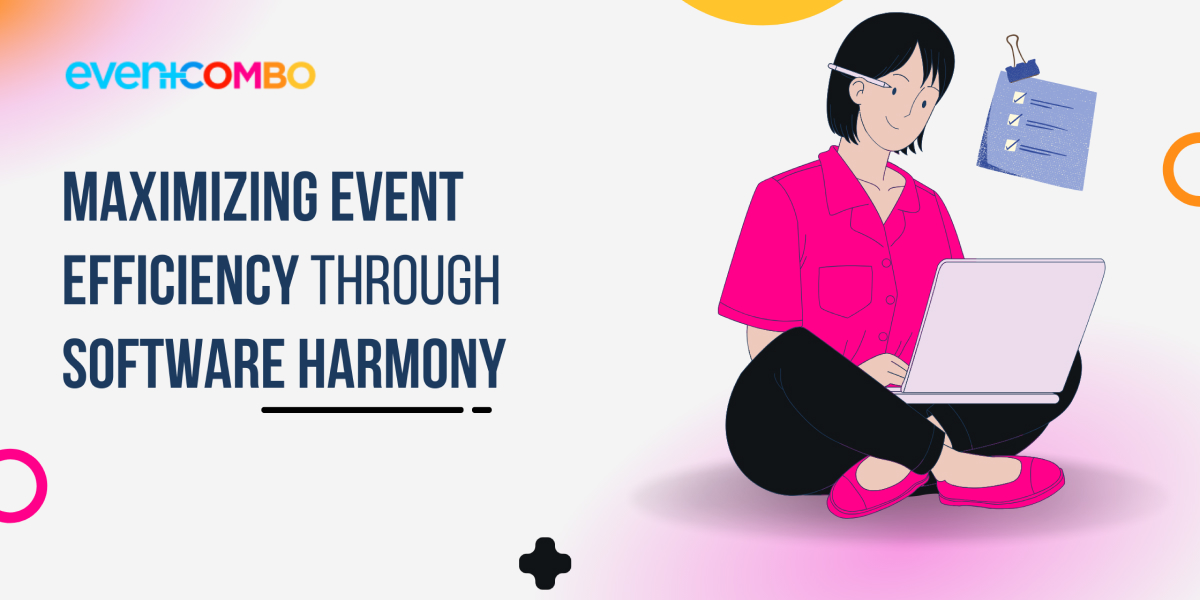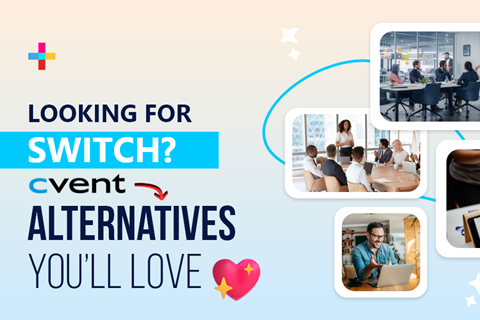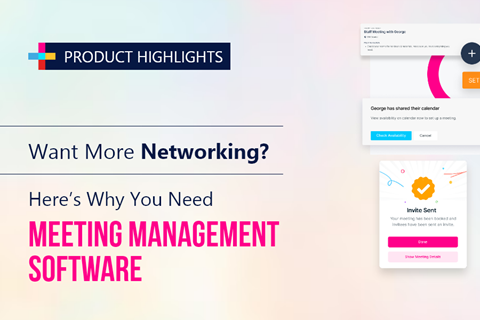6 Must-Have API Integrations for Your Event Management Software

Jan 08, 2024 Shruti Shah
As the event industry evolves in response to changing expectations from both attendees and organizers, and with a renewed emphasis on in-person experiences, the role of event management software has become paramount. These systems are now the linchpin for seamless event execution. Consequently, the demand for centralized platforms has surged, with people seeking adaptable solutions that align with the dynamic nature of the industry.
To not only stay ahead in the competitive landscape but also achieve targeted return on investment (ROI), it's imperative to unlock new potential through strategic integration of various technologies with your event management software. In this blog, we'll delve into six essential integrations your event management software must offer.
Why You Need Multiple Integrations in Your Event Management Platform
Achieving success in event planning demands high adaptability and innovation, and to stay a step ahead in the game, the integration of diverse software systems is pivotal. For event planners, integration proves indispensable as it streamlines workflows, reduces manual efforts, and minimizes errors—whether it's handling payments or interpreting analytics data through visualization.
When you opt for an event management platform having an open API, it ensures you stay agile and have the power to adapt to emerging trends by incorporating multiple systems without disruption. Furthermore, contrary to the belief that API integrations are costly, they actually contribute to cost-effectiveness by consolidating tasks and eliminating redundancies, allowing you to focus on delivering high-quality events without the hassle of managing complex and disjointed systems.
In a competitive market, a commitment to innovation is paramount for staying ahead, and integrated event management systems position you at the forefront of technological advancements, providing that crucial competitive edge. It unlocks operational efficiency, facilitates exceptional attendee experiences, and maintains a competitive edge in the rapidly evolving landscape of event management.
Despite Eventcombo boasting over 150+ integrations, we've cherry-picked six for their substantial impact on event planning. These integrations promise to provide the peace of mind you've longed for but never fully achieved in your event planning endeavors.
1. CRM Integration
One of the cornerstones of successful event planning is comprehending your attendees. Integrating Customer Relationship Management (CRM) systems with your event management software opens a wealth of possibilities for enhancing attendee engagement. This seamless integration facilitates the synchronization of attendee data with your existing CRM, allowing you to maintain a firm grip on the information you already possess.
Through this synergy, your funnels remain consistently updated, and new data is seamlessly incorporated directly into your CRM. This not only streamlines the management of attendee information but also ensures that your communication strategies are well-informed and personalized. The result is targeted marketing that resonates with your audience, creating a more profound understanding of attendee preferences. A seamlessly integrated CRM system guarantees that every interaction with your attendees is not only impactful but contributes to fostering lasting relationships over time.
2. Marketing Automation
Executing a successful event promotion strategy requires precision and consistency across multifaceted tasks. Integrating marketing automation software with your event management platform revolutionizes the way you handle promotional activities. Utilizing an email marketing engine, this integration facilitates the automation of email campaigns, personalized messages, and social media posts, allowing for a streamlined and cohesive promotional approach.
The benefits are extensive: personalized emails can be effortlessly scheduled and sent, ensuring timely and relevant communication. The user-friendly interface simplifies the process of private labeling, bulk data entry, and the creation of reminder emails. The tracking capabilities embedded in this integration provide valuable insights, allowing you to gauge the effectiveness of your promotional efforts.
In essence, marketing automation becomes the engine that not only saves valuable time but also elevates the effectiveness of your promotional endeavors. From generating pre-event buzz to executing post-event follow-ups, this integration enhances your overall promotional strategy, maximizing attendance and engagement through efficient, targeted communication.
3. Payment Gateway Integration
Effectively managing event finances poses a logistical challenge, but the integration of a secure payment gateway with your event management software is a transformative solution. Within the same platform, attendees can seamlessly register and pay for tickets or services, significantly reducing friction in the payment process. This integration not only elevates user experience but also ensures the secure handling of financial transactions, providing both organizers and attendees with peace of mind.
With hassle-free ticket purchases, payment tracking, and sales reporting, this integration offers a comprehensive suite of features. Organizers can create and manage various ticket types and tiers, making their event programming scalable for all types of events and formats. The customizable event pages and the ability to start and stop sales empower organizers with greater control over the entire ticketing process. Moreover, the system efficiently manages inventory, ensuring that organizers have real-time insights into ticket availability and sales.
4. ERP Integration
Integrating Enterprise Resource Planning (ERP) systems with your event management software can significantly enhance operational efficiency. ERP integrations allow seamless coordination between various aspects of your event, such as logistics, inventory management, and resource allocation. By connecting your existing systems, you can ensure that every dataset is synchronized, eliminating the need for manual data entry and reducing the risk of errors.
This integration proves particularly valuable for large-scale events where the coordination of resources and logistics is complex. It streamlines processes related to procurement, budgeting, and overall resource planning. With ERP integration, you gain a holistic view of your event's operational aspects, enabling better decision-making and resource optimization. This not only saves time but also contributes to cost-effectiveness by preventing resource wastage and enhancing overall event management efficiency.
5. Printing Integration
Event planning involves a lot of on-site logistics, including printing badges, schedules, and promotional materials. We get it; it's not the most thrilling part, but it's essential. When you're on-site, dealing with all these materials, the last thing you want is to run around setting up printers, right?
Now, here's the game-changer you need - the ability to integrate any printer with your event management software effortlessly. Smooth check-ins, no last-minute stress. When your event software and printer work together, you're sure that everything you print matches your branding. It's about keeping everything professional and cohesive without any fuss, and there you have one less thing to worry about.
In today’s event programming, where personalization and branding are so important, printing setup streamlines a big process, keeping the event flow smooth. It ensures that no time is wasted, no efforts are scattered in different directions, while you have your materials there, on time, and on brand. Attendee experience? Elevated. Event success? Nailed it.
6. Google Services Integration
Integrating with Google Services, including Google Calendar, Google Drive, and Google Analytics, can enhance collaboration and accessibility for event planners. This integration allows for seamless synchronization of schedules, easy sharing of documents, and comprehensive analysis of website and marketing performance.
By incorporating Google Services, you can centralize communication and document sharing within your event management platform. This ensures that team members have real-time access to relevant information and can collaborate more effectively. Moreover, integration with Google Analytics provides valuable insights into event website traffic and attendee engagement, allowing for data-driven decisions to optimize your event strategies.
The well-integrated event management software goes beyond surface-level data; it empowers organizers with key insights to drive ROI. The ability to generate customizable reports and delve into multievent reporting provides a comprehensive view of event success across various parameters. Automation features ensure that organizers can effortlessly gather and interpret data, saving valuable time and resources.
Future-Proofing Your Events with Integrations
In today's dynamic event management landscape, staying ahead requires a strategic approach to technology integration. Software integration empowers organizers to plan, manage, and execute events with ease and full control.
With software integrations, you can establish a robust event management ecosystem. This not only meets current demands but also future proofs your events in a rapidly evolving industry.
Discover the possibilities with over 150 integrations offered by Eventcombo. Connect with our experts now - https://bit.ly/3R9bkuP
close








